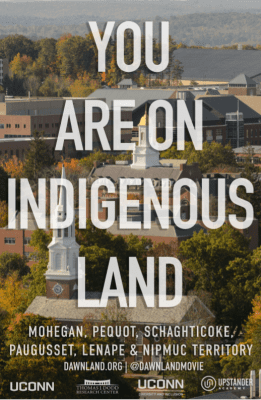What is a Land Acknowledgement?
A Land Acknowledgement is a formal statement that recognizes and respects Native peoples as traditional stewards of lands. The statement highlights the enduring relationship between Native peoples and their traditional territories.
Why do we Recognize the Land?
All land in the State of Connecticut was once Native territory, which is why it is our duty to acknowledge that the University of Connecticut a land grant institution, is existing on Native land. It is important to understand the long-standing history that has brought you to reside on the land and to seek to understand your place within that history. Land acknowledgments do not exist in the past tense or historical context: colonialism is a current ongoing process, and we need to build our mindfulness of our present participation. It is also worth noting that acknowledging the land is Indigenous protocol. –http://www.lspirg.org/knowtheland
The Office for Diversity and Inclusion worked with the three co-founders of the Akomawt Educational Initiative to create a land acknowledgment that rightfully recognizes the history of the Native peoples territories. It is important to our office to work with members of the greater Connecticut community to continue our efforts of educating our campus on the value of diversity and inclusion. This initiative continues to fulfill the mission of the Office for Diversity and Inclusion to continue to build a more welcoming and inclusive community.
How to use the Land Acknowledgement?
At the University of Connecticut, the Land Acknowledgement Statement can be read aloud or distributed by anyone who wishes to use it — at public or private events — on University property.

Land Acknowledgement Statement
We would like to begin by acknowledging that the land on which we gather is the territory of the Mohegan, Mashantucket Pequot, Eastern Pequot, Schaghticoke, Golden Hill Paugussett, Nipmuc, and Lenape Peoples, who have stewarded this land throughout the generations. We thank them for their strength and resilience in protecting this land, and aspire to uphold our responsibilities according to their example.
Pronunciations
Mohegan (Mo-he-gan)
Mashantucket Pequot (Mash-un-tuck-it Pea-kwaht)
Eastern Pequot (Pea-kwaht)
Schaghticoke (ska-teh-COKE)
Golden Hill Paugussett (paw-GUS-it)
Nipmuc (Nip-muck)
Lenape (Leh-NAH-pay)
Additional Resources
Find out what tribal land you live on
https://native-land.ca/
UConn Office for Diversity and Inclusion
https://diversity.uconn.edu/
Community Partners
https://www.akomawt.org/about-us.html